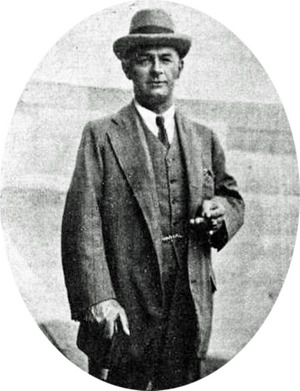Frederick Ranalow facts for kids
Frederick Ranalow (born November 7, 1873 – died December 8, 1953) was a famous singer from Ireland. He was known for his deep voice, called a baritone. He sang in operas, which are plays set to music, and also in musical theater. He is most famous for playing Captain Macheath in an opera called The Beggar's Opera. He sang this role nearly 1,500 times! He also acted in a few movies and wrote some songs.
Contents
About Frederick Ranalow
Frederick Baring Ranalow was born in Kingstown, which is now called Dún Laoghaire, in County Dublin, Ireland. When he was very young, his family moved to England. By the time he was 10, he was singing in the choir at St Paul's Cathedral in London. Later, he went to Westminster School and studied music at the Royal Academy of Music. He became a special member, called a Fellow, of the Royal Academy because of his amazing music career.
Early Performances
As early as 1895, Frederick Ranalow was singing in big musical performances called oratorios and cantatas. He performed at famous places like the Queen's Hall and the Royal Albert Hall. Between 1904 and 1929, he sang many times at a well-known music festival called the Proms. In 1909, he even toured Australia and New Zealand with the famous singer Dame Nellie Melba.
Opera Star
Ranalow sang with the Beecham Opera Company in many important roles. Some of his famous parts included:
- Figaro in The Marriage of Figaro
- Papageno in The Magic Flute
- Hans Sachs in Die Meistersinger von Nürnberg
- Falstaff in Falstaff
- A main role in Prince Igor
He was especially well-known for his role as Figaro during the First World War. He also appeared in other popular operas like The Tales of Hoffmann, Die Fledermaus, and La bohème. In 1916, he created the role of Ned Travers in Ethel Smyth's opera The Boatswain's Mate.
The Beggar's Opera
In 1920, Ranalow took on the role of Captain Macheath in The Beggar's Opera at the Lyric Theatre in Hammersmith. This role became his most famous. He sang it an incredible 1,463 times! His name is still strongly connected to this character. He also sang in the next opera in the series, called Polly.
Later Career
Frederick Ranalow continued to perform in important musical events. In 1921, he was the main baritone singer in a performance of Stanford's At the Abbey Gate. He also sang in Elgar's The Dream of Gerontius as a tribute to another singer. In 1922, his singing in Ralph Vaughan Williams's A Sea Symphony was a highlight of the Oxford Festival. His last performance at the Proms was in 1929, when parts of The Beggar's Opera were sung there for the first time.
Later, he acted in stage plays and light operas. He appeared in shows like Beloved Vagabond and The Toymaker of Nuremberg. In 1932, the famous actor John Gielgud even suggested him for a role in Shakespeare's play The Winter's Tale.
Film Appearances
Frederick Ranalow also appeared in several films:
- The King's Highway (1927), where he played Macheath
- The Lost Chord (1933)
- Autumn Crocus (1934)
- Who's Your Lady Friend? (1937)
- The Knight of the Burning Pestle (a TV show in 1938)
- Uncle Silas (1947)
He also wrote some songs. One famous folk song, "Barbara Allen", was originally dedicated to him by the composer Roger Quilter.
Frederick Ranalow passed away in London in 1953, at the age of 80.
Recordings
Frederick Ranalow made many recordings of his performances. Some of them include:
- A 1920 recording of The Beggar's Opera.
- The role of Archibald Grosvenor in the 1921 recording of Patience.
- Sir Joseph Porter in the 1922 recording of H.M.S. Pinafore.
- Sharpless in the first English recording of Madama Butterfly.
- Parts from Dame Ethel Smyth's opera The Boatswain's Mate.
- Various songs, including "The Floral Dance".
Personal Life
Frederick Ranalow married Lillian Mary Oates. She was the sister of Captain Lawrence Oates, a famous explorer. Frederick and Lillian had a son and a daughter. Their son, Patrick Baring Oates Ranalow, was born in 1914. He became a Flight Lieutenant in the Royal Air Force Volunteer Reserve. Sadly, he died while serving in 1945 and is buried in Germany.
 | Tommie Smith |
 | Simone Manuel |
 | Shani Davis |
 | Simone Biles |
 | Alice Coachman |


